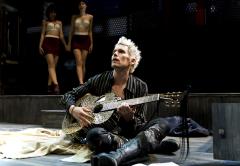| What's
Love Got To Do With It
"Clive,"
adapted by Jonathan Marc Sherman from "Baal" by Bertolt
Brecht.
Directed by Ethan Hawke for The New Group
at the Acorn Theater,
410 W. 42 St., NYC.
Feb. 7 - March 9, 2013.
Mon. - Wed. at 7 PM; Thurs. - Sat. at 8 PM; Sat. at 2 PM.
Tickets are $61.25 at http://www.thenewgroup.org/tickets or 212-239-6200
or 800-432-7250.
$16.25 Student "No Rush" tickets day of performance.
 |
Foreground:
Ethan Hawke.Background, L-R: Mahira Kakkar,
Stephanie Janssen. Photo by Monique Carboni. |
Clive is an old-school rock star -- as badass as they come. Women.
Drugs. Liquor. Artistic tantrums. His are legend. As portrayed by
Ethan Hawke, who also directs "Clive" at the Acorn Theater,
even at his worst, he’s charismatic.
Hawke is joined in stellar performances by Vincent D’Onofrio
(Detective Goren on "Law and Order: Criminal Intent" returning
to the stage after a decade) as his best buddy, and an appealing Zoe
Kazan, multiply cast as Clive’s abused lovers and the woman
who carries his baby. If the script by Jonathan Marc Sherman ("Things
We Want"), who also performs, were better crafted, "Clive"
might be a home run.
The play opens Mech’s Den, something like a nightclub, where
Clive reigns like a tyrant. His sexual magnetism and talent send everyone
groveling. He returns their admiration with contempt. We watch him
flirt with and fondle an unidentified woman (Stephanie Janssen) --
more abusively than tenderly. It is a shock to discover that she is
his manager’s wife and that his manager is seated at the same
table. You would expect the scene to explode into a heated confrontation.
Instead the antagonism dissipates. And as I wondered if the manager
didn’t care, I was taken out of the scene.
"Clive" is Sherman’s adaptation of "Baal"
(1918), a novice play by Bertolt Brecht, father of Epic Theatre and
the Alienation Effect (Verfremdungseffekt). Epic Theatre plays are
supposed to stop short to force viewers to think about what they are
witnessing rather than to identify with a character. Brecht sometimes
called his works learning plays. "Clive" has several musical
interludes, when we get to hear Hawke sing and strum his guitar accompanied
by Dana Lyn on violin and piano. (Music is by Latham and Shelby Gaines.)
Derek McLane’s ingenious set design includes several free standing
doors with strings, mallets, and other innovations attached, which
the actors "play", as though they were instruments. The
design creates surprising, delicate effects -- and interrupts scenes.
The scenes are short, another alienating device. But cutting off a
dramatic action is not Brechtian.
Like Charlie Sheen, Kurt Cobain, the younger Mick Jagger and Keith
Richards -- Clive pushes the limits. He savors his outrageousness.
The play is structured not on character development but on shocks
to our basic sense of decency, even in this seen-it-all, done-that
age. The love scenes are the best. Clive’s indifference to his
pregnant girlfriend -- reminiscent of Goethe’s Faust and Gretchen
-- is a jolt because Kazan plays her so vulnerable and so in love.
Clive begins to seem not just cruel but lacking a vital human gene.
The seduction of a friend’s girlfriend, who is a virgin, is
erotic and moving, making both her subsequent action and his reaction
all the more horrifying. Bedding the giggling twins was probably nose-thumb
at a bourgeois society in Brecht’s . Now it’s just a signal
of his unhappiness. But it works either ways.
Clive’s turning point, ironically, is caused by genuine feeling.
He becomes jealous when Doc (a superbly unpredictable D’Onofrio),
his best friend, falls in love. Clive’s subsequent again is
a real shock -- which presages the final scene, which is very disturbing,
close to unbelievable in its human indifference to suffering. Thanks
in large part to some inspired directorial choices, Hawke and D’Onofrio’s
strong fraternal bond is joyful and almost palpable. Certainly the
play snaps to life up as their friendship grows. Their moments together
on stage are even more memorable when Kazan joins them.
Hawke’s Clive is moody, introspective, low-key, inarticulate
about his motivation, yet very interesting as performance. The scene
where he joins the junkies at a funeral and steals the dead man’s
ATM card is almost pure Brecht.
The New Group, founded in 1995 as an actors’ collective dedicated
to staging "ambitious work that pushes boundaries," calls
"Clive" one of the biggest and boldest in our history. Under
the direction of Scott Elliott, they have offered outstanding productions,
such as "The Prime of Miss Jean Brody," in which Zoe Kazan,
playing opposite Cynthia Nixon, lit up the stage in her New York theatre
debut. For "Clive" they have assembled some of the best
established talent, including Catherine Zuber ("Golden Boy")
for costumes, Jeff Croiter ("Newsies") for lighting, and
actor Aaron Krohn ("The Coast of Utopia"). The New Group
and Ethan Hawke are brave to have taken on such a challenging, rarely
performed play, and talented enough to have almost pulled it off.
|


